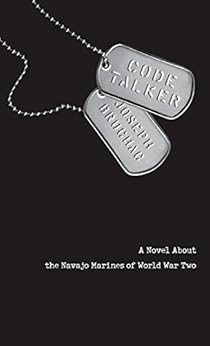So, here goes.
Code Talkers is a historical novel written concerning an interesting piece of World War II history. I'm not sure how common the knowledge of Navajo Code Talkers are these days. I knew about it, but I pick up a lot of random information in my voluminous reading. It was however top secret for decades after the end of the war.
WWII was a war that relied on secure communications. Massive armies and all their support staff had to be in communication to a greater degree than ever before necessary. The problem was that the Japanese were really good at breaking U.S. codes and had prepared for the war by learning many of the languages spoken here including many of the languages of various Native American groups. However, one language they did not learn, because of it's incredible difficulty to learn, was Navajo. So the U.S. Marine Corps recruited groups of bilingual Navajo to develop a code that was underpinned by the Navajo language. The japanese never broke the code mostly because they couldn't understand the language that it was based on.
This book is a fictionalized account of one of these code talkers, Ned Begay. Ned's story starts when he was six and saying goodbye to his parents for the first time to go to Mission School. One of the goals of these schools was to stamp out the Navajo language with, one can only assume, the great goal of culturally integrating the Navajo into the U.S.'s European derived culture. Ned does well and becomes fluent in English. He continues on to High School, and when Pearl Harbor is bombed, he wants to join the fight. He does, and the novel follows Ned as he survives through the war.
According to Bruchac's Author Note, he had a hard time finding a way to write this story. He wanted to write a book about the Code Talkers but experimented with several different formats before settling on a novel. Apparently, the first draft was more history book than it was story. I think this struggle is evident in the text. The narrator, a much older version of Ned who is telling the story to his grandchildren, always seems oddly removed from the events of the story - almost dispassionate. I think this distance in the voice is a relic of the author's struggle finding a format.
Despite the dispassionate narrative voice, Code Talkers is a good account of the War for young readers. Additionally, it also introduces and addresses several issues about the U.S. treatment of the Navajos and attitudes about their culture including their forced relocation at one point and the campaign to eradicate the language. All in all, it's a good transition to fiction for students who tend to prefer nonfiction.

No comments:
Post a Comment